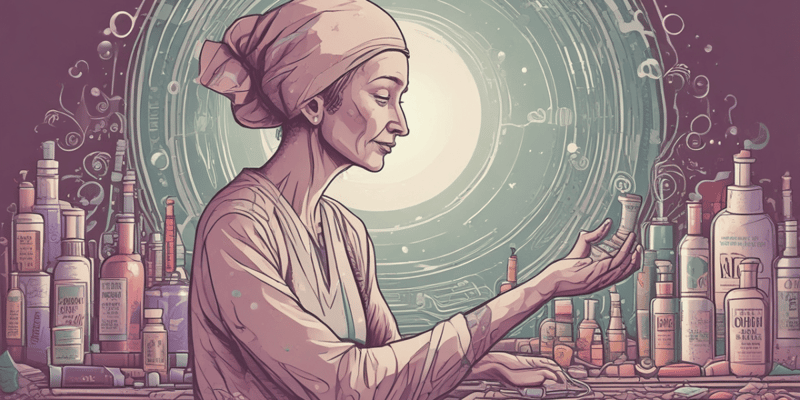Questions and Answers
What is the ultimate goal of chemotherapy?
To eradicate every neoplastic cell
Why is combination drug chemotherapy more successful than single-drug treatment?
It has a wider therapeutic index
What percentage of cancer patients will be cured by surgery and/or local radiation?
Less than 25%
Why do most currently available anticancer drugs not specifically recognize neoplastic cells?
Signup and view all the answers
If a cure is not attainable, what becomes the goal of chemotherapy?
Signup and view all the answers
What is the second leading cause of mortality after cancer?
Signup and view all the answers
Which phase of the cell cycle is characterized by cells being relatively inactive metabolically and resistant to most chemotherapeutic drugs?
Signup and view all the answers
What are the common adverse effects associated with chemotherapy?
Signup and view all the answers
What is the goal of treatment in advanced stages of cancer?
Signup and view all the answers
Which type of chemotherapeutic agents are effective against replicating cells?
Signup and view all the answers
Which of the following is a warning sign of cancer as mentioned in the text?
Signup and view all the answers
What is the purpose of debulking in cancer treatment?
Signup and view all the answers
Which phase of the cell cycle follows DNA replication?
Signup and view all the answers
Which category of chemotherapeutic agents are structurally related to normal compounds that exist within the cell and interfere with the availability of normal purine or pyrimidine nucleotide precursors?
Signup and view all the answers
"Alleviation of symptoms and avoidance of lifethreatening toxicity" is the goal of treatment in which stage of cancer?
Signup and view all the answers
"A sore that does not heal" is mentioned in the text as a warning sign for which type of cancer?
Signup and view all the answers
Study Notes
Chemotherapy Goals and Principles
- The ultimate goal of chemotherapy is to cure cancer.
- Combination drug chemotherapy is more successful than single-drug treatment because it allows for a lower dose of each drug, reducing toxicity and increasing effectiveness.
Cancer Treatment Outcomes
- Only 20-30% of cancer patients will be cured by surgery and/or local radiation.
- If a cure is not attainable, the goal of chemotherapy becomes alleviation of symptoms and avoidance of life-threatening toxicity.
Anticancer Drugs
- Most currently available anticancer drugs do not specifically recognize neoplastic cells, which is why they can be toxic to normal cells.
- Chemotherapeutic agents effective against replicating cells are classified as cycle-specific agents.
Cell Cycle and Chemotherapy
- The G0 phase of the cell cycle is characterized by cells being relatively inactive metabolically and resistant to most chemotherapeutic drugs.
- The G2 phase follows DNA replication in the cell cycle.
Chemotherapeutic Agents
- One category of chemotherapeutic agents is structurally related to normal compounds that exist within the cell and interfere with the availability of normal purine or pyrimidine nucleotide precursors.
Cancer Symptoms and Treatment
- A sore that does not heal is a warning sign for cancer.
- Debulking in cancer treatment aims to reduce the size of a tumor to make it more manageable for other treatments.
Adverse Effects and Mortality
- Common adverse effects associated with chemotherapy include nausea, vomiting, hair loss, and fatigue.
- Infections are the second leading cause of mortality after cancer.
Studying That Suits You
Use AI to generate personalized quizzes and flashcards to suit your learning preferences.
Description
Test your knowledge of anticancer drugs and principles of cancer chemotherapy with this quiz. Explore the key concepts related to cancer treatment and the use of systemic chemotherapy.





